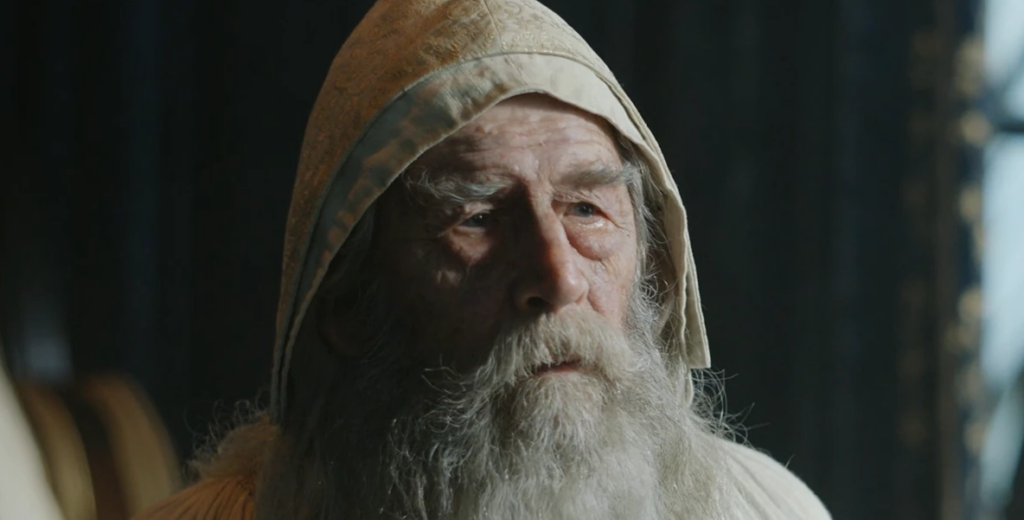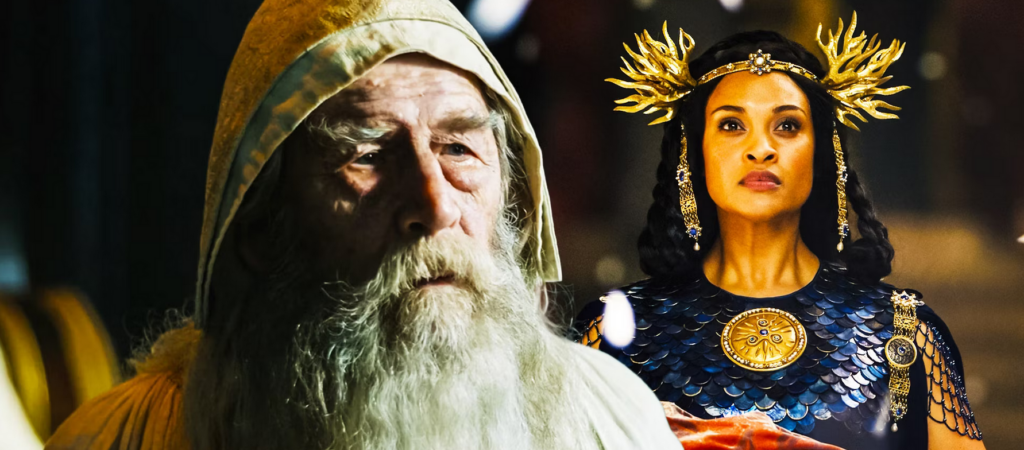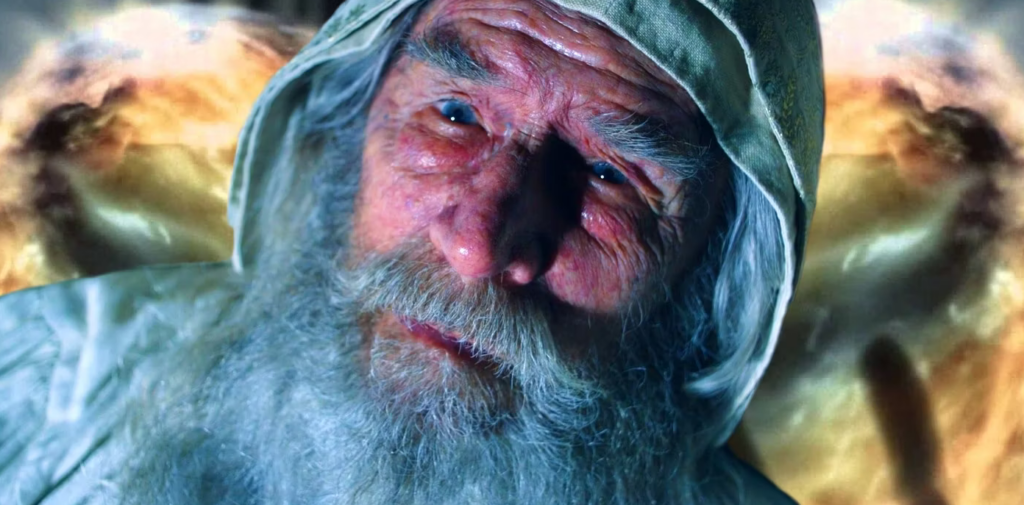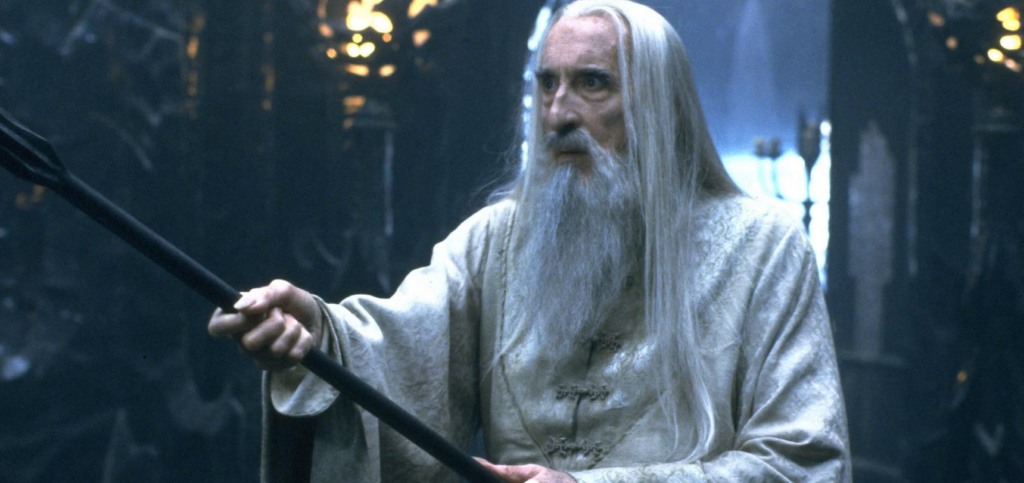Tar-Palantir in The Lord of the Rings: The Rings of Power
1 comment


Introduction
In The Lord of the Rings: The Rings of Power, Tar-Palantir, played by Ken Blackburn, stands as a central figure whose influence is felt throughout the series. As the King of Númenor, his role is pivotal to the unfolding events, particularly in the face of political and existential threats. His reign is marked by a deep concern for the well-being of Númenor and its people, as he navigates a period of internal strife and external dangers. This character is portrayed as wise and cautious, often reflecting on the past glories and the current decline of his kingdom. His leadership is not just about governance; he embodies the hopes and fears of a society at a crossroads. One of the key aspects of his role is his attempt to steer the complex political landscape of Númenor. The kingdom is divided between those who wish to maintain the old ways and those who advocate for change. He strives to preserve the integrity and autonomy of Númenor, often finding himself at odds with more progressive elements within his court. This creates a backdrop of political tension that drives much of the series' conflict. Additionally, his relationship with his daughter, Queen Míriel, is crucial. His influence on her governance and the decisions she makes are significant in shaping the direction of Númenor. This dynamic adds depth to the storyline, illustrating the personal and political complexities of leadership in a crumbling empire. His guidance and wisdom are meant to steer Númenor through its darkest times, though his influence is sometimes challenged by the rapidly changing political and social landscape. His interactions with other key characters and the broader Middle-earth narrative further test his leadership against the encroaching threat of Sauron and the growing power of the Dark Lord. His role is not just that of a ruler but also a symbol of resistance against the forces threatening his world.
The Complex Political Landscape
The political landscape of Númenor during his reign is fraught with tension and division. As a leader deeply rooted in traditional values, he faces resistance from more progressive factions within his court and society. This internal division represents a significant conflict between maintaining the old ways and adapting to new realities. His resistance to change and reluctance to embrace new alliances create friction with those who believe that modernization and strategic shifts are necessary for the kingdom’s survival. This tension is emblematic of the broader generational and ideological divides within the kingdom, highlighting the challenges of leadership and succession during a period of crisis. The external threat posed by Sauron is another critical element of his conflicts. As the Dark Lord’s influence grows, his ability to protect Númenor is increasingly jeopardized. His conservative approach to governance and his reluctance to form new alliances or adapt to changing circumstances place the kingdom at greater risk. This external conflict with Sauron represents a significant challenge to his leadership, forcing him to confront the limits of his strategies and the potential consequences of his decisions. Additionally, he struggles with his own health and the impact it has on his ability to govern effectively. His deteriorating condition affects his decision-making capabilities and raises concerns about the stability of Númenor’s leadership. This personal struggle adds another layer of complexity to his character and amplifies the external and internal conflicts he faces.

Relationship with Míriel
The relationship between him and his daughter, Míriel, plays a crucial role in shaping the plot and exploring key themes of the series. Their dynamic reflects both personal and political dimensions that significantly impact the narrative and the fate of Númenor. His relationship with Míriel is characterized by a complex interplay of affection, expectation, and ideological difference. As the king, he holds traditionalist views that emphasize maintaining the established order and upholding Númenor’s ancient customs. In contrast, Míriel represents a more progressive and reformist perspective, advocating for change and adaptation in response to the kingdom’s evolving circumstances. This generational and ideological divide creates tension between them, influencing their interactions and decisions throughout the series. The impact of their relationship is evident in several key plot developments. Míriel’s role as queen is significantly shaped by her father’s influence and legacy. Her approach to governance, including her decisions about alliances and strategies, is partly a reaction to her father’s traditionalism. As his health deteriorates, Míriel’s increasing responsibility and leadership become central to the narrative. Her ability to navigate the challenges of ruling a kingdom in decline is directly affected by her father’s legacy and the pressures to both honor and challenge his views. Their relationship also highlights the broader themes of tradition versus progress. Their conflicting viewpoints on how to handle the threat of Sauron and the internal strife within Númenor reflect the larger struggle between maintaining the old ways and adapting to new realities. This tension adds depth to the storyline, illustrating the complexities of leadership and succession in a time of crisis. Míriel’s actions and decisions are influenced by her father’s example, but she also seeks to forge her own path, balancing respect for the past with the need to address contemporary challenges.

The Threat of Sauron
His perspective on the threat of Sauron is a significant aspect of his character and influences the broader narrative of the series. His views on this looming danger reflect both his traditionalist stance and the political and existential challenges facing Númenor. His perspective on Sauron is shaped by his deep respect for the ancient traditions and lore of Númenor. He views the threat of Sauron with a sense of urgency and concern, recognizing the Dark Lord’s growing influence and the potential danger it poses to his kingdom and the wider world. However, his approach to addressing this threat is influenced by his adherence to traditional values and reluctance to embrace new strategies or alliances. One of the key aspects of his perspective is his belief in the importance of maintaining Númenor’s traditional ways. He is wary of forming new alliances or adopting unconventional methods to counter the threat of Sauron, preferring instead to rely on established practices and the wisdom of the past. This traditionalist approach is rooted in his commitment to preserving the legacy and autonomy of Númenor, even in the face of a formidable adversary. His perspective also reflects a sense of caution and hesitancy. His reluctance to fully engage with new strategies or align with other realms stems from a fear of compromising Númenor’s integrity and sovereignty. This cautious approach can be seen as both a strength and a limitation, as it underscores his dedication to preserving the kingdom’s heritage but also limits his ability to respond effectively to the evolving threat of Sauron. As the series progresses, his perspective on Sauron becomes a point of tension within the narrative. His views are challenged by other characters who advocate for more proactive measures and alliances to combat the Dark Lord. This conflict highlights the broader struggle between maintaining tradition and adapting to new realities, adding depth to the series’ exploration of leadership and resistance.
Health and Governance
His health is a crucial factor influencing his ability to govern Númenor. His deteriorating condition significantly impacts his leadership and the stability of the kingdom, adding a layer of complexity to the series’ political and personal drama. His health is portrayed as a source of concern and limitation throughout the series. His declining physical condition affects his capacity to make decisions, engage in governance, and lead effectively. This personal struggle creates a backdrop of uncertainty and instability within Númenor, as the king’s health issues become intertwined with the broader challenges facing the kingdom. One of the key effects of his health on his governance is the delegation of responsibilities. As his condition worsens, he is forced to rely more heavily on his daughter, Míriel, to handle the day-to-day affairs of the kingdom. This shift in responsibility creates a dynamic where Míriel’s leadership becomes increasingly prominent, highlighting the tensions between traditional values and the need for new approaches. The delegation of power also exposes the vulnerabilities and limitations of his rule, affecting the kingdom’s ability to respond to internal and external threats. The impact of his health on his ability to govern is also reflected in the political climate of Númenor. His declining condition exacerbates the existing political divisions within the kingdom, as factions vie for influence and control in the face of an uncertain leadership transition. This internal strife adds to the complexity of the narrative, illustrating the challenges of maintaining stability and unity during a period of crisis. Furthermore, his health affects his ability to engage with key external threats, such as the looming menace of Sauron. His physical limitations restrict his ability to actively participate in strategic decisions and diplomatic efforts, placing additional strain on the kingdom’s defenses. This situation underscores the difficulties of leading a nation in decline and highlights the broader implications of personal health on leadership and governance.

Conclusion
In The Rings of Power, the character played by Ken Blackburn is a multifaceted figure whose influence permeates the series. His role as the King of Númenor is marked by a deep commitment to traditional values and a cautious approach to governance. His leadership is characterized by a struggle to balance the preservation of Númenor’s heritage with the need to address contemporary challenges. His relationship with his daughter, Míriel, adds a personal dimension to the political drama, highlighting the complexities of leadership and succession in a time of crisis. The external threat of Sauron and the internal political strife within Númenor further complicate his reign, testing his resolve and challenging his ability to protect his kingdom. His health issues add another layer of complexity to his character, affecting his decision-making and the stability of Númenor’s leadership. Despite these challenges, his character embodies the themes of resistance and perseverance, symbolizing the struggle to uphold tradition in the face of overwhelming adversity. His legacy is one of both strength and limitation, reflecting the broader themes of leadership, sacrifice, and the consequences of adhering to tradition in a changing world. Through his character, the series explores the intricacies of governance and the impact of personal and political challenges on the fate of Númenor and Middle-earth.

Comments